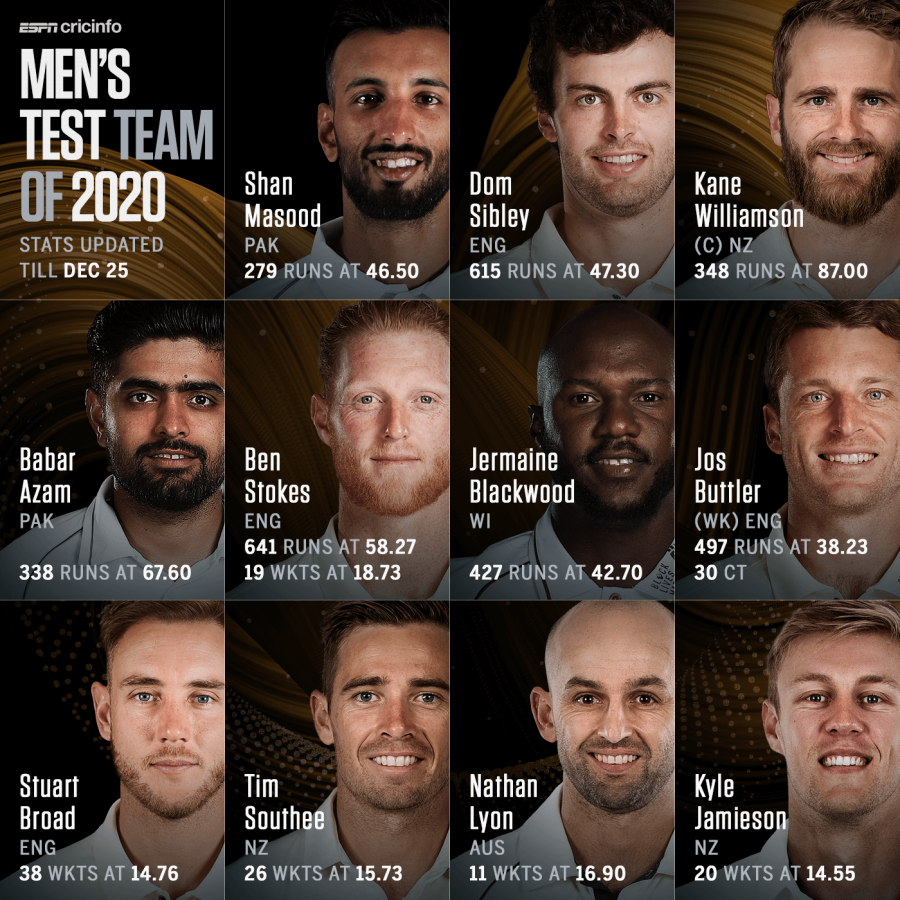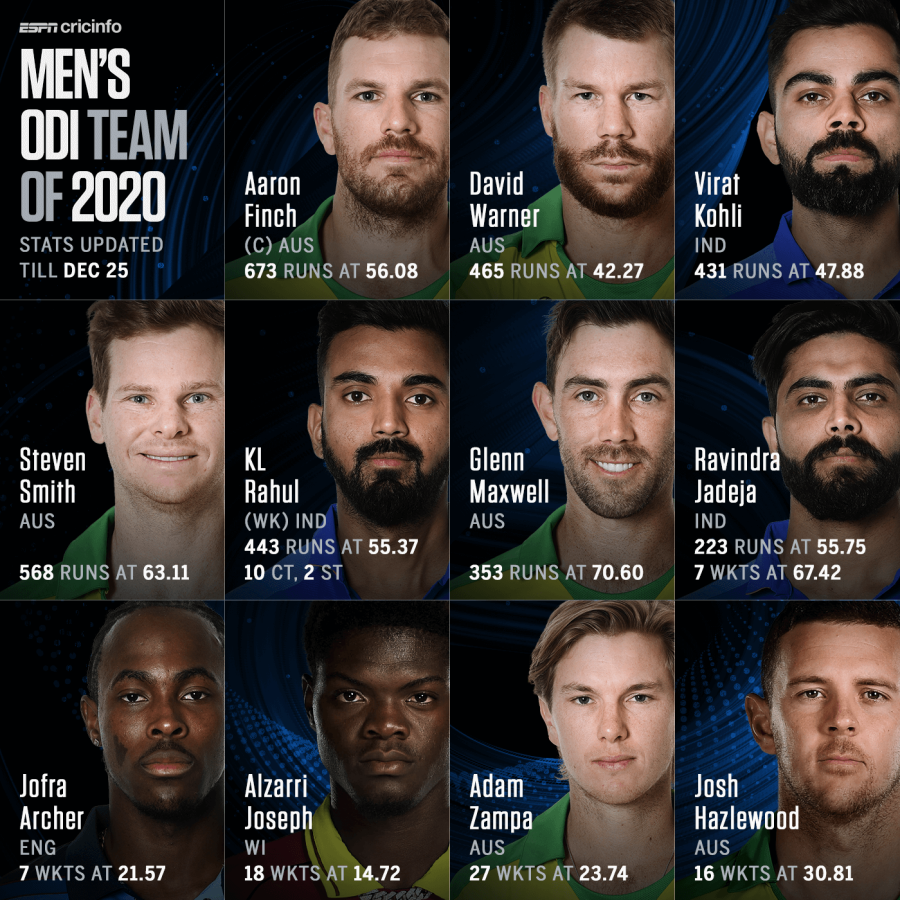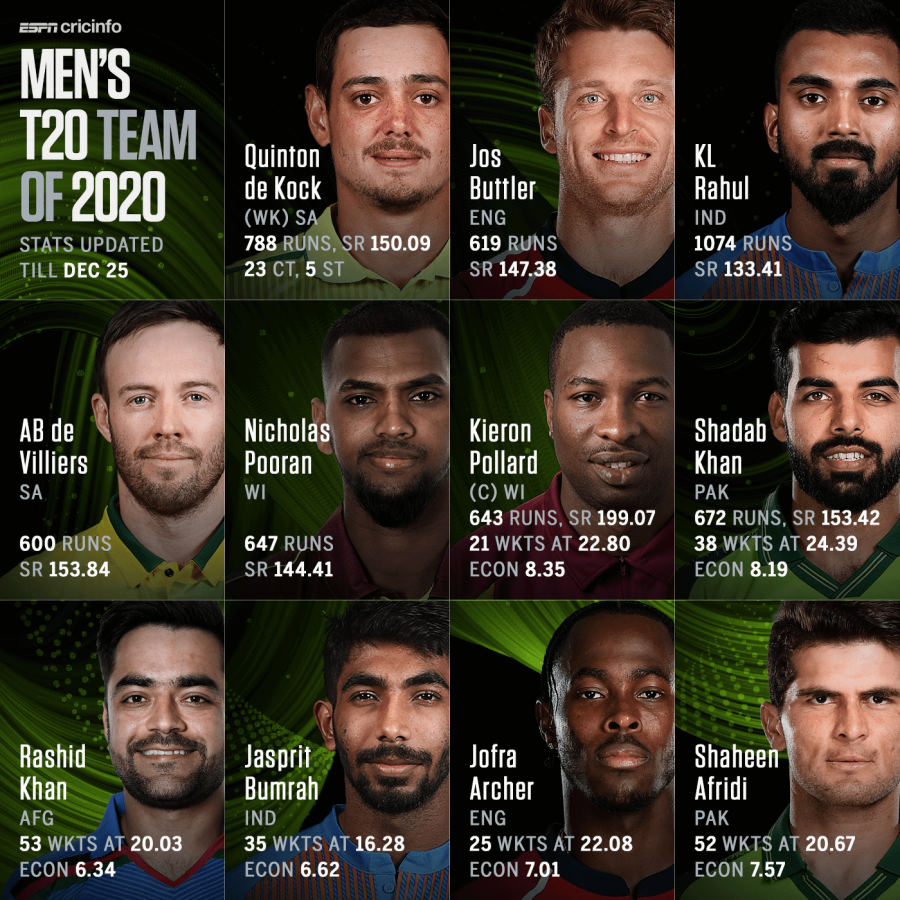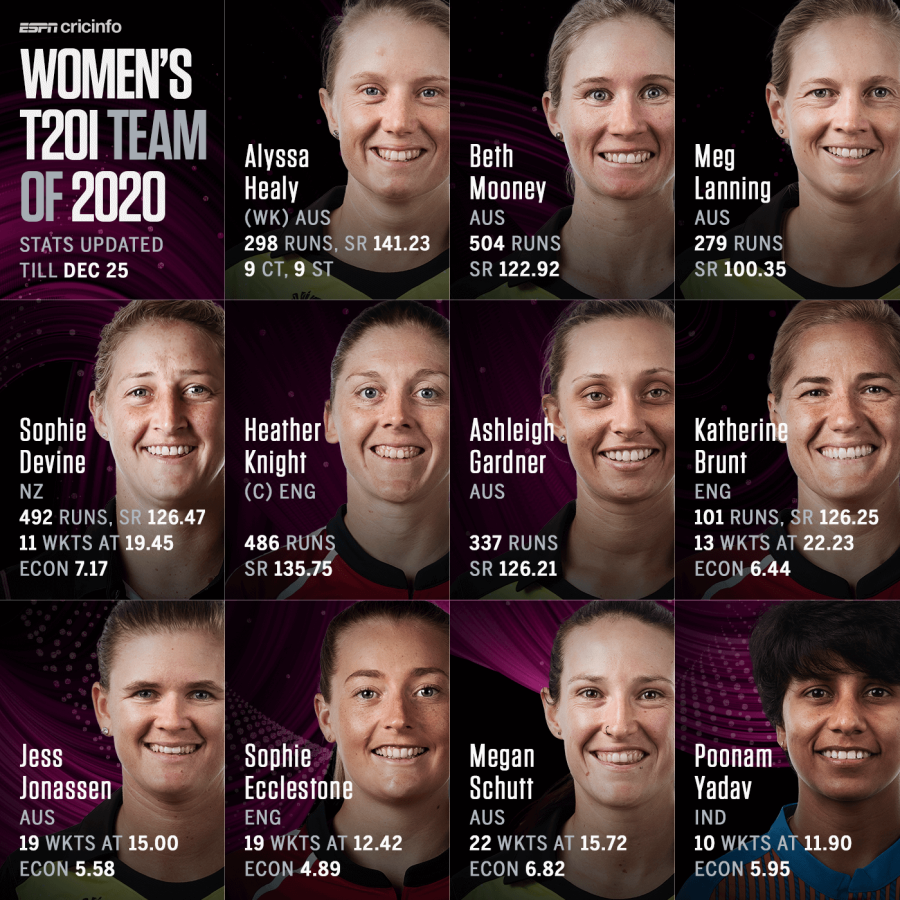ESPNcricinfo’s staff picked their Test, ODI, T20 and women’s T20I teams of the year. Do they resemble yours?
Even including the three Boxing Day fixtures, there have been fewer men’s Test matches played in 2020 than in any year since 1991, and the same is true of men’s ODIs. Even still, that hasn’t stopped ESPNcricinfo’s staff from completing an annual ritual: testing our ability as selectors and picking our teams of the year. Don’t forget to let us know where we’ve got it wrong.

Only four teams played more than three men’s Tests in 2020 before our Christmas cut-off date, so it is no surprise that their players dominate the team of the year. England lead the way with four players included, and three New Zealanders, two Pakistanis, a West Indian and an Australian join them.
Dom Sibley is an automatic selection, having scored more than twice as many runs as any other opener in the year, while Shan Masood joins him at the top thanks to hundreds at home against Bangladesh and away in England. Kane Williamson slots in behind them, following his masterful 251 against West Indies, while Babar Azam and Ben Stokes, who had prolific years, are in at No. 4 and 5. Zak Crawley, whose 267 against Pakistan was the biggest innings of the year, is a notable omission.
Jos Buttler‘s place in the England side was under immense scrutiny back in January, but he put doubts over his Test credentials to bed with a superb series with the bat against Pakistan. He also led the way for most dismissals behind the stumps, helping him earn selection ahead of Quinton de Kock in this side. Jermaine Blackwood would have seemed an unlikely candidate for this XI at the start of the year but he earned a West Indies recall thanks to four-day runs for Jamaica, and played two of the most entertaining innings of the year: a match-winning 95 in England, and a counter-punching 104 in New Zealand.
The three front-line seamers were easy picks, all averaging around 15: Stuart Broad passed the 500-wicket mark in Tests, dominating the English summer after being left out at its start, while Tim Southee and Kyle Jamieson tore India and Pakistan to shreds. In a year dominated by seamers, Nathan Lyon takes the spinner’s berth despite only playing two Tests.

After losing series to India and South Africa at the start of the year, Australia have been dominant in post-lockdown ODIs, winning both in England and at home against India. As a result, their players make up the majority of this team, with Aaron Finch and David Warner in as openers.
It speaks volumes about Virat Kohli‘s lofty standards that even in a year in which he has seemed to underachieve, he still managed five half-centuries in nine ODI innings and averaged a shade under 50 to slide in at No. 3 in this side, while Steven Smith and KL Rahul were both popular selections in the middle order. Glenn Maxwell brings his power-hitting to the No. 6 role, with a strike rate of 145.26 and an average above 70 in 2020, while Ravindra Jadeja slides in at No. 7 to balance the XI.
Adam Zampa is the leggie to complement Jadeja and Maxwell’s fingerspin, leading the wicket charts for the calendar year with 27, and he is joined by his two closest competitors on that front in Alzarri Joseph and Josh Hazlewood. Jofra Archer played only three ODIs, but terrorised Warner sufficiently to earn a place in this side.
Several players’ cases would have been stronger if the pandemic had allowed them to play more games, with South Africa’s Heinrich Klaasen, Bangladesh’s Liton Das and Oman’s Aqib Ilyas all impressing with the bat in their limited number of games.

While there was a Covid-induced pause in the otherwise relentless calendar of T20 tournaments, almost all major leagues were held at some stage in the year, meaning this XI did not suffer from a small sample size to the same extent as the others.
Look away now, Pakistan fans: there is no place for Babar Azam in our side. He was beaten to the opening slots by only a couple of votes. In his place, de Kock takes the gloves after a stellar year for both South Africa and the Mumbai Indians, while Buttler made up for his hit-and-miss IPL with some belligerent innings at the top of the England batting order.
Rahul’s orange-cap-winning IPL and consistency for India pushed him ahead of Mohammad Hafeez for the No. 3 slot, while AB de Villiers, Nicholas Pooran and Kieron Pollard‘s middle-order fireworks form the side’s engine room, from No. 4-6.
Shadab Khan‘s breakthrough year with the bat combined with his wicket-taking threat sees him picked at No. 7, forming a mouth-watering legspinning partnership with Rashid Khan, the year’s standout spinner as usual. Haris Rauf may have been the leading wicket-taker for 2020, but his relatively high economy rate means he misses out to three seamers who form a compelling trio: Shaheen Afridi and Archer take the new ball, with Jasprit Bumrah doing the heavy lifting at the death.
Andre Russell, Mushfiqur Rahim, Marcus Stoinis and Dawid Malan are among the honourable mentions with the bat, while Sandeep Lamichhane, Samit Patel and Kagiso Rabada had successful years with the ball.

With a T20 World Cup at the start of the year and most nations frustrated by a lack of playing opportunities since, performances in that tournament, unsurprisingly, carry plenty of weight among these selections. Six Australians from their World Cup-winning side make it to this team, with three of them – Alyssa Healy, Beth Mooney and Meg Lanning – forming the top of our batting order.
Sophie Devine averaged 54.66 and scored 492 runs in the year – comfortably twice as many as any of her New Zealand team-mates – but she moves into the middle order thanks to the quality of Australia’s top three. Heather Knight, a transformed T20 batter in recent times, slots in at No. 5, following her best year in the format by a huge margin, and the middle-order batting is rounded off by Ashleigh Gardner, who edged out Nat Sciver by a single vote.
With the ball, Katherine Brunt and Megan Schutt form an enticing new-ball partnership after leading the wicket-taking charts among seamers for the year, while Sophie Ecclestone and Jess Jonassen with 19 wickets apiece, are both picked as left-arm spinners. Poonam Yadav‘s beguiling start to the T20 World Cup – and her four-wicket haul against Australia – earned her inclusion as the main legspinner.
Fellow leggies Sarah Glenn and Amelia Kerr are both unfortunate to miss out, after finishing the year with 18 and 14 wickets respectively and economy rates below 5.5. Despite India’s run to the final, Yadav is their only representative in the XI, with Smriti Mandhana and Shafali Verma both overlooked.






